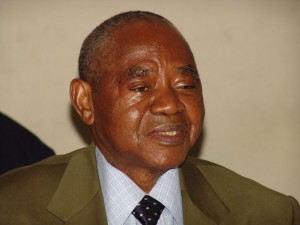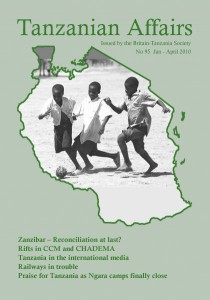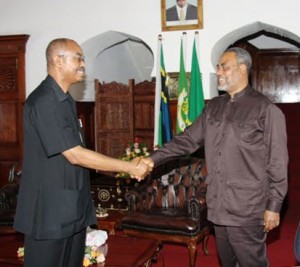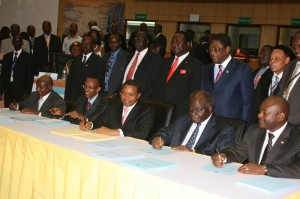Tanzanian Affairs has been giving prominence in recent issues to reports on the various corruption cases which have been widely and frequently debated in Parliament, the media and elsewhere.
Kikwete – “578 Cases in court”
In a historic first ‘question and answer session’ broadcast live on all major television and radio networks on September 9, President Kikwete answered many questions, from around the country, on corruption. “We have taken steps and, as we speak, there are 578 corruption cases in the courts” he said. He added that the number was only 58 in 2005 when he had assumed power. He brushed off claims that his government was harbouring people suspected of grand corruption within the government and the ruling CCM party.
He also dismissed claims that the ruling party of which he was Chairman, was silencing MP’s who spoke out about corruption in the National Assembly. He also cited cases currently going on in various courts as well as senior public officials who were facing charges of abuse of office and embezzlement. He said that the respective anti-corruption agencies were finalising two or three cases involving high-profile personalities. “Our party would like MPs to speak out and assess their government” he said, “but that should be done in a way that protects the party’s interests too.”
Tanzania drops 24 places
A few days later, the international Berlin-based anti-corruption watchdog ‘Transparency International (TI)’ released a report showing that Tanzania had dropped 24 places in the ‘Global Corruption Perception Index (CPI)’ from the 102nd position in 2008 to the 126th spot in 2009.
The CUF Leader in Parliament, Hamad Rashid Mohammed, said the Judiciary did not act fast to clear pending corruption cases, while the Prevention and Combating of Corruption Bureau (PCCB) was dragging its feet in investigating allegations of grand corruption. Hamad told The Citizen that, although Parliament had been at the forefront in the fight against graft, many corruption scandals had been exposed but the Executive and Judiciary had so far done nothing.
Another government critic said that many corruption suspects were being acquitted because of the PCCB’s ‘shoddy investigations’ and its failure to effectively prosecute those charged with corruption.
The PCCB Public Relations Officer said she had not seen the TI report, but added that reports that Tanzania had fared better than other East African countries were ‘encouraging’. Rwanda had won accolades for wide-ranging steps to improve governance and gone up 14 positions to break into the top 100. Burundi, the worst performer in the region, was ranked 168th. Tanzania’s best ranking was 94 in 2007, when Parliament finally set up the PCCB.
The long-running Richmond saga (see earlier issues of TA)
The investigative newspaper ‘This Day’ revealed in October that, in addition to all the other irregularities, the controversial Richmond Development Company (which had later become Dowans Holdings), had tried to obtain more than $115 million from the government in 2006 for capacity and energy charges, under the later badly discredited emergency power supply contract it had signed. But, according to the paper, this represented a hefty profit as it had only spent $30m to install the planned 100-megawatt power plant in Dar es Salaam.
According to government sources quoted by the paper, Richmond/Dowans was subsequently paid more than $42m. The government had also paid $4,865 (approx. Shs 6bn/-) for airlifting some of the power generators, consumables, and other accessories from the United States. But, apparently, what the company brought in was only 20MW of power generating sets – one fifth of what was needed under the contract. This however, still represented a hefty profit for Richmond, considering that the company spent just $30 million to install the plant in Dar es Salaam.
Dowans Holdings apparently bought the remaining power generators from South Africa. But a government technical team sent to Cape Town in December 2006 to assess the trailer-mounted turbines, was said to have discovered that some of the equipment was rusty.
The formal termination of the contract between Richmond/Dowans and the government in 2009 paved the way for certain persons to set in motion yet another plan to obtain $69 million by selling the power generators to the government. It was only the fierce opposition to the proposal mounted by the parliamentary Energy and Minerals Committee and others, that blocked this from going ahead.
Towards the end of last year, while some MP’s were becoming increasingly restive as they waited to hear the government’s reactions to the numerous recommendations in the parliamentary report dated February 2007, the government announced that it intended to resurrect the company, as electricity supplies were again proving inadequate – The Guardian.
In October 2009, according to the Guardian, there was some surprise, amid escalating power rationing, that the government’s call for tenders for new emergency power generating plants failed to attract any competent bidders.
Government takes over and starts producing electricity
Eventually President Kikwete directed the appropriate ministers to take over the plant, which had been idle for several years, from its liquidators, to ease the crippling shortage of electricity.
Standard Chartered Bank (Hong Kong) then told the High Court that this decision was contrary to a court order that had placed the company under receivership and asked the court to halt the move as it would be unfair. The case was adjourned – Mwananchi.
During November the plant finally began producing electricity.
The Bank of Tanzania’s ‘Two Towers’ scandal
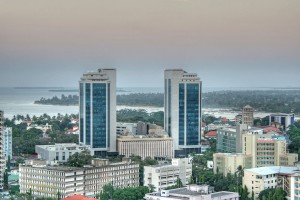
The Bank of Tanzania's two towers in Dar-es-Salaam
There are four cases of alleged corruption involving the Bank of Tanzania.
Prosecution in the first has been proceeding slowly. Former Bank Director of Personnel and Administration Amatus Liyumba, on trial for causing over Shs 221 billion loss to the government, told the court that the decision to revise the cost of building the bank’s headquarters was made by the Board of Directors and the Bank’s Governor, not him. Nothing could have been done without the approval of the Board. The prosecution charges that Mr Liyumba
and Mr Balali changed the scope and added extra works not covered in the contract, making the original tender cost
shoot up from $73 million to $357 million. The project involved building a 14 storey north tower at a cost of US$ 26 million and a south tower at US$ 29 miliion.
The ‘whistleblower’
In mid-November the Guardian on Sunday published a tribute to the person it described as the ‘whistleblower’ in the case who had, in April 2006, made the bold decision to go public. ‘Knowing that his decision, apart from costing him his job could also cost him his life, the man acted in the interest of his fellow countrymen.’
As expected, he lost his job and faced attacks from the Bank through a press release questioning his integrity as an engineer. The person concerned was reported now to consider himself lucky, because if he had approved the project, he would be spending his days and nights at the Keko Maximum Prison with his former boss Amatus Liyumba.’ He was transferred to Mwanza, where he spent two years more or less aimlessly. “They wanted to keep me away from HQ” he was quoted saying. “I feel so bad for being paid for doing nothing” he added. He was reported to be living happily in the outskirts of Dar es Salaam where he was running a construction firm to get by. “I would have made millions” he said.
Banknotes scandal
The Citizen reported in September that four senior employees of the Bank had been charged over the loss of Shs 104 billion, in yet another scandal involving the inflation of the cost of printing new bank notes.
The fourth scandal concerns the siphoning off, by some 22 companies, of Shs 133 billion through the Bank’s EPA account which has been described in detail in earlier issues of TA.
Gold auditing case
In this case, former senior cabinet ministers Basil Mramba and Daniel Yona (plus two other senior officials) have been charged with abuse of office that caused the Government a loss of over Shs 221 billion after granting tax waivers to a gold auditing firm, Alex Stewart (Assayers). The controversial assignment saw the company take $50 million in fees which sparked off a public outcry. Seventeen witnesses were being called to testify against the former ministers but the defence refused to reveal the names of their witnesses. The magistrates accepted this before the case was adjourned – Guardian.
The prosecution said, during the preliminary hearing, that Mramba signed government notices exempting the corporation from taxes in disregard of advice given by the Tanzania Revenue Authority (TRA) and had prepared an agreement between the company and the BoT which was amended without Attorney General and cabinet approval.
The Radar saga back in the limelight
Attention in the Radar case has switched to the UK where the Senior Fraud Office (SFO) has completed its enquiries and is asking the Attorney General to proceed with the prosecution of BAE which supplied the equipment. The Times of London wrote that if BAE would agree to pay up to £500 million (Tanzania is not the only country in which the company is accused of paying bribes) in a ‘plea bargain’ the problem could be resolved. But BAE felt that any admission of guilt would be unacceptable as it would undermine its huge markets in the USA and other countries. The paper said, that faced with the SFO’s ultimatum, it had decided to call the SFO’s bluff. It indicated that if the figure (for the Tanzania case) was in the range of £10-20 billion and that BAE would not be tainted with corruption and instead face lesser charges, negotiations might be renewed. However, the article went on to say that in dealing with Prime Minister Gordon Brown (and not Tony Blair) BAE would be likely to be rebuffed.
Progress in the investigations in Tanzania has been going slowly – the Director General of the PCCB was said to be waiting for the final report from the SFO in the UK. The key individuals being investigated by the PCCB include former Attorney General Andrew Chenge, former Bank of Tanzania Governor Idris Rashid, and prominent businessmen Tanil Somaia and Shailesh Vithlani. The local and foreign investigations forced Chenge to resign from the cabinet last year – Guardian.
MP’s allowances
As in Britain, allowances provided for MP’s, have become a cause of discord in Tanzania. Some MP’s are being accused of taking double payments from meetings they attend – Nipashe.
The opposition has said that the whole system is rotten and the PCCB has set in motion a number of investigations. It has been alleged that some corporations and government institutions have been paying Shs 200,000 daily to MP’s who also get parliamentary day allowances. House Speaker Samuel Sitta and others have been quoted in the Swahili press as justifying the allowances as ‘traditional Tanzanian hospitality’ and that the PCCB should not be investigating MP’s without consulting him.



